外企面试经常问的十个问题
- 格式:doc
- 大小:24.00 KB
- 文档页数:2
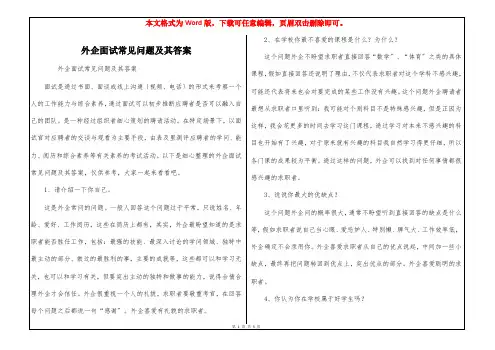
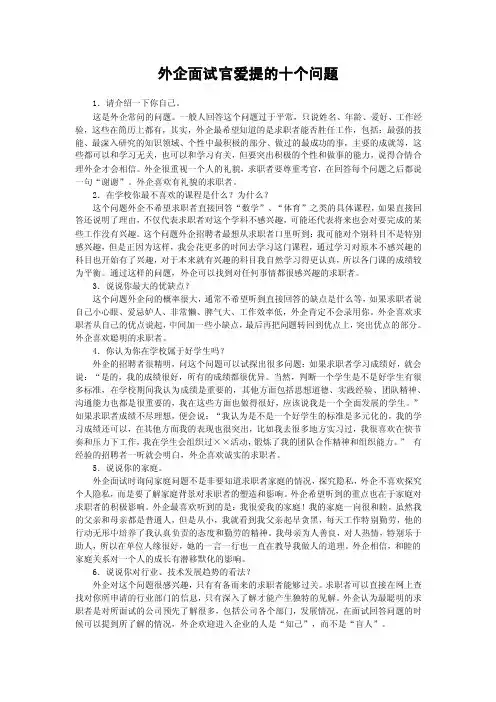
外企面试官爱提的十个问题1.请介绍一下你自己。
这是外企常问的问题。
一般人回答这个问题过于平常,只说姓名、年龄、爱好、工作经验,这些在简历上都有,其实,外企最希望知道的是求职者能否胜任工作,包括:最强的技能、最深入研究的知识领域、个性中最积极的部分、做过的最成功的事,主要的成就等,这些都可以和学习无关,也可以和学习有关,但要突出积极的个性和做事的能力,说得合情合理外企才会相信。
外企很重视一个人的礼貌,求职者要尊重考官,在回答每个问题之后都说一句“谢谢”。
外企喜欢有礼貌的求职者。
2.在学校你最不喜欢的课程是什么?为什么?这个问题外企不希望求职者直接回答“数学”、“体育”之类的具体课程,如果直接回答还说明了理由,不仅代表求职者对这个学科不感兴趣,可能还代表将来也会对要完成的某些工作没有兴趣。
这个问题外企招聘者最想从求职者口里听到:我可能对个别科目不是特别感兴趣,但是正因为这样,我会花更多的时间去学习这门课程,通过学习对原本不感兴趣的科目也开始有了兴趣,对于本来就有兴趣的科目我自然学习得更认真,所以各门课的成绩较为平衡。
通过这样的问题,外企可以找到对任何事情都很感兴趣的求职者。
3.说说你最大的优缺点?这个问题外企问的概率很大,通常不希望听到直接回答的缺点是什么等,如果求职者说自己小心眼、爱忌妒人、非常懒、脾气大、工作效率低,外企肯定不会录用你。
外企喜欢求职者从自己的优点说起,中间加一些小缺点,最后再把问题转回到优点上,突出优点的部分。
外企喜欢聪明的求职者。
4.你认为你在学校属于好学生吗?外企的招聘者很精明,问这个问题可以试探出很多问题:如果求职者学习成绩好,就会说:“是的,我的成绩很好,所有的成绩都很优异。
当然,判断一个学生是不是好学生有很多标准,在学校期间我认为成绩是重要的,其他方面包括思想道德、实践经验、团队精神、沟通能力也都是很重要的,我在这些方面也做得很好,应该说我是一个全面发展的学生。
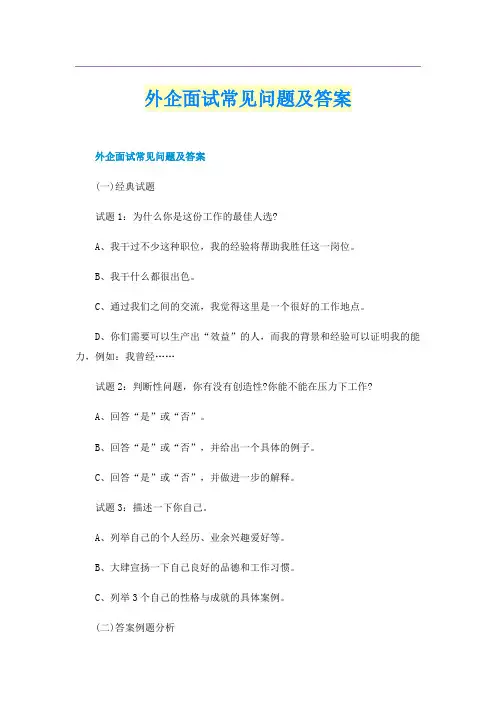
外企面试常见问题及答案外企面试常见问题及答案(一)经典试题试题1:为什么你是这份工作的最佳人选?A、我干过不少这种职位,我的经验将帮助我胜任这一岗位。
B、我干什么都很出色。
C、通过我们之间的交流,我觉得这里是一个很好的工作地点。
D、你们需要可以生产出“效益”的人,而我的背景和经验可以证明我的能力,例如:我曾经……试题2:判断性问题,你有没有创造性?你能不能在压力下工作?A、回答“是”或“否”。
B、回答“是”或“否”,并给出一个具体的例子。
C、回答“是”或“否”,并做进一步的解释。
试题3:描述一下你自己。
A、列举自己的个人经历、业余兴趣爱好等。
B、大肆宣扬一下自己良好的品德和工作习惯。
C、列举3个自己的性格与成就的具体案例。
(二)答案例题分析例题1:A、错误。
经验是好的,但“很多相同职位”也许更让人觉得你并不总能保证很好的表现。
B、错误。
很自信的回答,但是过于傲慢。
对于这种问题合适的案例和谦虚更重要。
C、错误。
这对雇主来说是一个很好的恭维,但是过于自我为中心了,答非所问。
应该指出你能为雇主提供什么。
D、最佳答案。
回答问题并提供案例支持在这里是最好的策略。
例题2:A、错误。
没有支持的答案总是显得不可信。
即使是这种只需要回答“是”或“否”的问题也需要具体的解释。
B、最佳答案。
一个简短的具体案例可以很好地支持你的答案,同时,也能表明你的自信和真诚。
C、错误。
具体案例可以更简单有力地说明你的能力。
在解释的时候,人们往往会跑题,夹杂不清。
同时,最好不要用“应聘指南”之类的“经典”套话,那会让你像个“职业”应聘的。
例题3:A、错误。
一般来说,招聘者更想通过这个问题了解你的习惯和行为方式。
个人的详细资料对他们来说没有任何意义。
B、自大并不能让你从竞争中脱颖而出。
回答完问题以后,你必须得到招聘者的信任并让他/她记住你。
这样的宣扬并不成功。
C、最佳答案。
案例是你能力最好的证据。
一个清晰简明有力的案例能让你从人群中脱颖而出,给招聘者留下好印象。
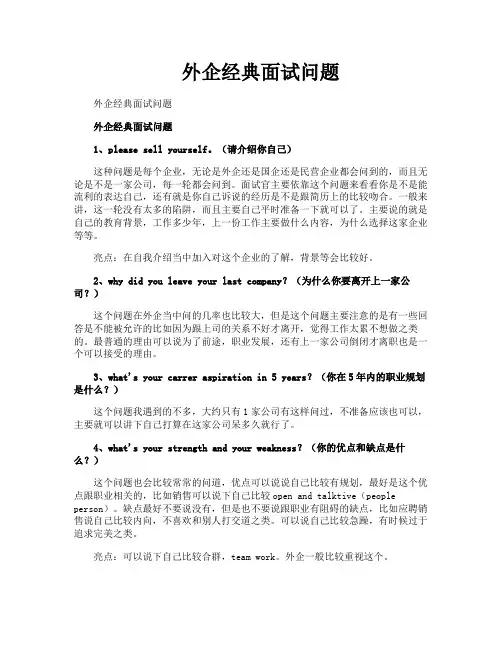
外企经典面试问题外企经典面试问题外企经典面试问题1、please sell yourself。
(请介绍你自己)这种问题是每个企业,无论是外企还是国企还是民营企业都会问到的,而且无论是不是一家公司,每一轮都会问到。
面试官主要依靠这个问题来看看你是不是能流利的表达自己,还有就是你自己诉说的经历是不是跟简历上的比较吻合。
一般来讲,这一轮没有太多的陷阱,而且主要自己平时准备一下就可以了。
主要说的就是自己的教育背景,工作多少年,上一份工作主要做什么内容,为什么选择这家企业等等。
亮点:在自我介绍当中加入对这个企业的了解,背景等会比较好。
2、why did you leave your last company?(为什么你要离开上一家公司?)这个问题在外企当中问的几率也比较大,但是这个问题主要注意的是有一些回答是不能被允许的比如因为跟上司的关系不好才离开,觉得工作太累不想做之类的。
最普通的理由可以说为了前途,职业发展,还有上一家公司倒闭才离职也是一个可以接受的理由。
3、what's your carrer aspiration in 5 years?(你在5年内的职业规划是什么?)这个问题我遇到的不多,大约只有1家公司有这样问过,不准备应该也可以,主要就可以讲下自己打算在这家公司呆多久就行了。
4、what's your strength and your weakness?(你的优点和缺点是什么?)这个问题也会比较常常的问道,优点可以说说自己比较有规划,最好是这个优点跟职业相关的,比如销售可以说下自己比较open and talktive(people person)。
缺点最好不要说没有,但是也不要说跟职业有阻碍的缺点,比如应聘销售说自己比较内向,不喜欢和别人打交道之类。
可以说自己比较急躁,有时候过于追求完美之类。
亮点:可以说下自己比较合群,team work。
外企一般比较重视这个。
5、Do you have any questions to ask us?(你对我们有什么问题可以问的吗?)这个问题主要考察的是你是不是对企业有关注,可以问下企业的培训,企业的组织结构,到公司主要做哪些事情,还可以适当问下待遇跟奖金之类。
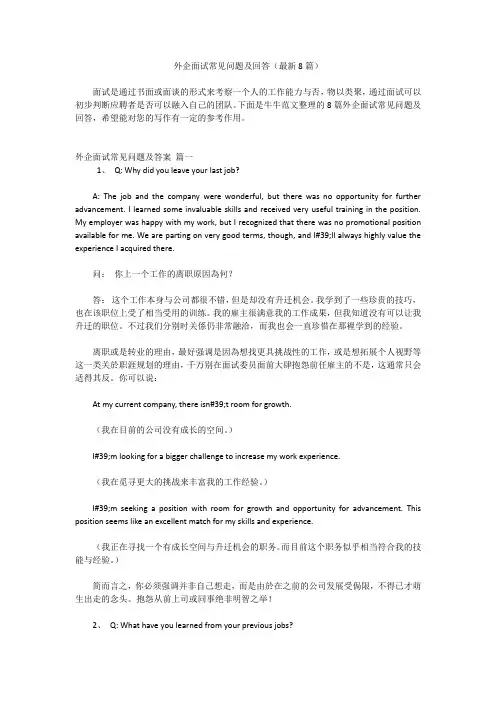
外企面试常见问题及回答(最新8篇)面试是通过书面或面谈的形式来考察一个人的工作能力与否,物以类聚,通过面试可以初步判断应聘者是否可以融入自己的团队。
下面是牛牛范文整理的8篇外企面试常见问题及回答,希望能对您的写作有一定的参考作用。
外企面试常见问题及答案篇一1、Q: Why did you leave your last job?A: The job and the company were wonderful, but there was no opportunity for further advancement. I learned some invaluable skills and received very useful training in the position. My employer was happy with my work, but I recognized that there was no promotional position available for me. We are parting on very good terms, though, and I#39;ll always highly value the experience I acquired there.问:你上一个工作的离职原因為何?答:这个工作本身与公司都很不错,但是却没有升迁机会。
我学到了一些珍贵的技巧,也在该职位上受了相当受用的训练。
我的雇主很满意我的工作成果,但我知道没有可以让我升迁的职位。
不过我们分别时关係仍非常融洽,而我也会一直珍惜在那裡学到的经验。
离职或是转业的理由,最好强调是因為想找更具挑战性的工作,或是想拓展个人视野等这一类关於职涯规划的理由,千万别在面试委员面前大肆抱怨前任雇主的不是,这通常只会适得其反。
你可以说:At my current company, there isn#39;t room for growth.(我在目前的公司没有成长的空间。
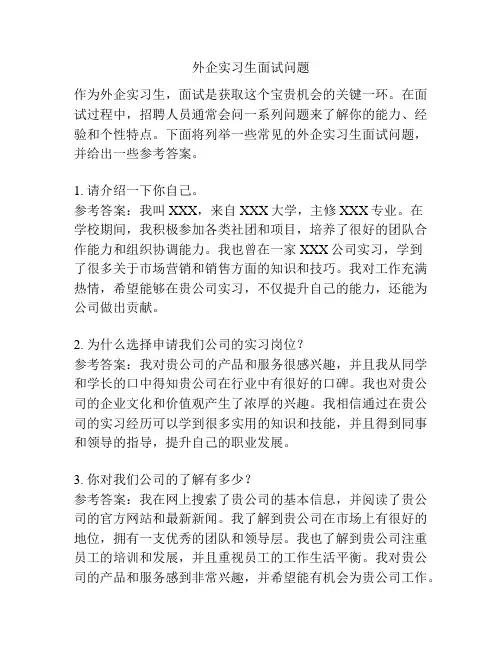
外企实习生面试问题作为外企实习生,面试是获取这个宝贵机会的关键一环。
在面试过程中,招聘人员通常会问一系列问题来了解你的能力、经验和个性特点。
下面将列举一些常见的外企实习生面试问题,并给出一些参考答案。
1. 请介绍一下你自己。
参考答案:我叫XXX,来自XXX大学,主修XXX专业。
在学校期间,我积极参加各类社团和项目,培养了很好的团队合作能力和组织协调能力。
我也曾在一家XXX公司实习,学到了很多关于市场营销和销售方面的知识和技巧。
我对工作充满热情,希望能够在贵公司实习,不仅提升自己的能力,还能为公司做出贡献。
2. 为什么选择申请我们公司的实习岗位?参考答案:我对贵公司的产品和服务很感兴趣,并且我从同学和学长的口中得知贵公司在行业中有很好的口碑。
我也对贵公司的企业文化和价值观产生了浓厚的兴趣。
我相信通过在贵公司的实习经历可以学到很多实用的知识和技能,并且得到同事和领导的指导,提升自己的职业发展。
3. 你对我们公司的了解有多少?参考答案:我在网上搜索了贵公司的基本信息,并阅读了贵公司的官方网站和最新新闻。
我了解到贵公司在市场上有很好的地位,拥有一支优秀的团队和领导层。
我也了解到贵公司注重员工的培训和发展,并且重视员工的工作生活平衡。
我对贵公司的产品和服务感到非常兴趣,并希望能有机会为贵公司工作。
4. 在你的实习经历中,你最大的成就是什么?参考答案:在我上一份实习的公司,我被分配到一个销售团队工作。
在我的努力下,我成功促成了一笔大额订单,并帮助公司实现了销售目标。
我通过与客户建立良好的关系,了解客户的需求,并提供满足需求的解决方案。
我也与团队成员合作,共同完成了这项任务。
这个成就使我对自己的能力更有信心,并且意识到团队合作的重要性。
5. 你在团队合作方面的经验如何?参考答案:在大学期间,我参加了很多小组项目,并且在实习期间也加入了一个销售团队。
通过这些经历,我学会了与不同背景和能力的团队成员合作,并协调彼此的工作进度和任务分工。
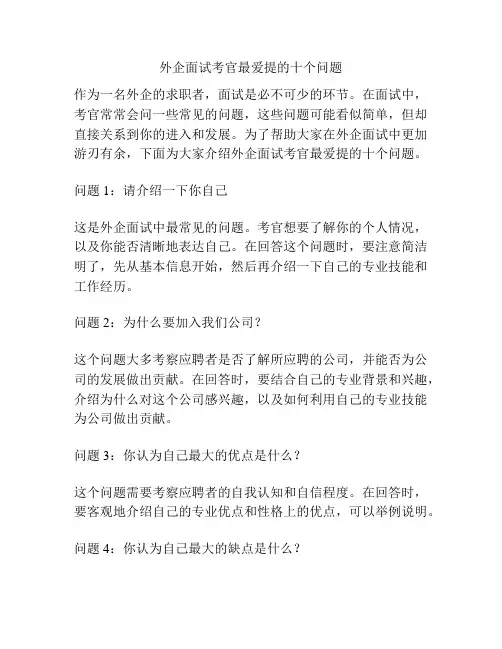
外企面试考官最爱提的十个问题作为一名外企的求职者,面试是必不可少的环节。
在面试中,考官常常会问一些常见的问题,这些问题可能看似简单,但却直接关系到你的进入和发展。
为了帮助大家在外企面试中更加游刃有余,下面为大家介绍外企面试考官最爱提的十个问题。
问题1:请介绍一下你自己这是外企面试中最常见的问题。
考官想要了解你的个人情况,以及你能否清晰地表达自己。
在回答这个问题时,要注意简洁明了,先从基本信息开始,然后再介绍一下自己的专业技能和工作经历。
问题2:为什么要加入我们公司?这个问题大多考察应聘者是否了解所应聘的公司,并能否为公司的发展做出贡献。
在回答时,要结合自己的专业背景和兴趣,介绍为什么对这个公司感兴趣,以及如何利用自己的专业技能为公司做出贡献。
问题3:你认为自己最大的优点是什么?这个问题需要考察应聘者的自我认知和自信程度。
在回答时,要客观地介绍自己的专业优点和性格上的优点,可以举例说明。
问题4:你认为自己最大的缺点是什么?应聘者在回答这个问题时,一定要注意不要说出不能克服的缺点。
要说出一个较小的缺点,并说明自己正在努力改进。
问题5:你最大的成就是什么?这个问题需要应聘者介绍自己过去曾经克服的困难和取得的成就。
应聘者在回答时,要从自己的硬实力和软实力两个角度来回答。
问题6:你最喜欢做的事情是什么?这个问题主要是考察应聘者的兴趣爱好和个性特点。
在回答时,应聘者可以介绍自己的爱好,并说明如何将自己的兴趣爱好应用到工作中。
问题7:你是否有过团队合作的经历?在外企工作中,团队合作是非常重要的。
通过这个问题,考官想要了解应聘者是否具备与他人合作的能力。
应聘者在回答时,可以介绍自己在团队中的角色和所做出的贡献。
问题8:你是否有过跨国公司工作经验?对于外企面试来说,具有跨国公司工作经验的应聘者往往更加受到重视。
应聘者在回答时,可以介绍自己在跨国公司中的工作经历和取得的成果。
问题9:你认为你是否具备在国际化环境中工作的能力?这个问题考察应聘者是否了解国际化环境所需的能力和素质。
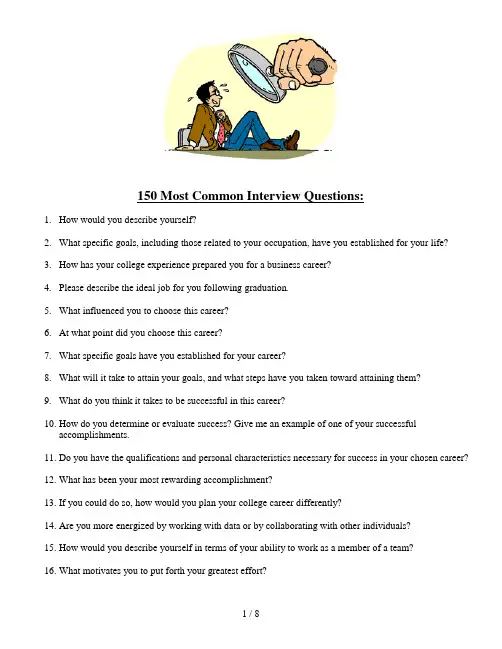
150 Most Common Interview Questions:1.How would you describe yourself?2.What specific goals, including those related to your occupation, have you established for your life?3.How has your college experience prepared you for a business career?4.Please describe the ideal job for you following graduation.5.What influenced you to choose this career?6.At what point did you choose this career?7.What specific goals have you established for your career?8.What will it take to attain your goals, and what steps have you taken toward attaining them?9.What do you think it takes to be successful in this career?10.How do you determine or evaluate success? Give me an example of one of your successfulaccomplishments.11.Do you have the qualifications and personal characteristics necessary for success in your chosen career?12.What has been your most rewarding accomplishment?13.If you could do so, how would you plan your college career differently?14.Are you more energized by working with data or by collaborating with other individuals?15.How would you describe yourself in terms of your ability to work as a member of a team?16.What motivates you to put forth your greatest effort?17.Given the investment our company will make in hiring and training you, can you give us a reason to hireyou?18.Would you describe yourself as goal-driven?19.Describe what you've accomplished toward reaching a recent goal for yourself.20.What short-term goals and objectives have you established for yourself?21.Can you describe your long-range goals and objectives?22.What do you expect to be doing in five years?23.What do you see yourself doing in ten years?24.How would you evaluate your ability to deal with conflict?25.Have you ever had difficulty with a supervisor or instructor? How did you resolve the conflict?26.Tell me about a major problem you recently handled. Were you successful in resolving it?27.Would you say that you can easily deal with high-pressure situations?28.What quality or attribute do you feel will most contribute to your career success?29.What personal weakness has caused you the greatest difficulty in school or on the job?30.What were your reasons for selecting your college or university?31.If you could change or improve anything about your college, what would it be?32.How will the academic program and coursework you've taken benefit your career?33.Which college classes or subjects did you like best? Why?34.Are you the type of student for whom conducting independent research has been a positive experience?35.Describe the type of professor that has created the most beneficial learning experience for you.36.Do you think that your grades are a indication of your academic achievement?37.What plans do you have for continued study? An advanced degree?38.Before you can make a productive contribution to the company, what degree of training do you feel youwill require?39.Describe the characteristics of a successful manager.40.Why did you decide to seek a position in this field?41.Tell me what you know about our company.42.Why did you decide to seek a position in this company?43.Do you have a geographic preference?44.Why do you think you might like to live in the community in which our company is located?45.Would it be a problem for you to relocate?46.To what extent would you be willing to travel for the job?47.Which is more important to you, the job itself or your salary?48.What level of compensation would it take to make you happy?49.Tell me about the salary range you're seeking.50.What are the most important rewards you expect to gain from your career?51.How would you define "success" for someone in your chosen career?52.What qualifications do you have that will make you successful in this company?53.What skills have you acquired from your work experience?54.What have you learned from your experiences outside the classroom or workplace?55.What criteria are you using to choose companies to interview with?56.If you were hiring for this position, what qualities would you look for?57.How would you describe your leadership skills?58.Which is more important: creativity or efficiency? Why?59.How has college changed you as a person?60.What have you accomplished that shows your initiative and willingness to work?61.What was the toughest challenge you've ever faced?62.What two or three things are most important to you in your job?63.Some people work best as part of a group -- others prefer the role of individual contributor. How wouldyou describe yourself?64.When given an important assignment, how do you approach it?66.When you have been made aware of, or have discovered for yourself, a problem in your school or workperformance, what was your course of action?67.What kinds of things have you done at school or on the job that were beyond expectations?68.What, in your opinion, are the key ingredients in guiding and maintaining successful businessrelationships?69.What sorts of things have you done to become better qualified for your career?70.Describe a situation in which you were able to use persuasion to successfully convince someone to seethings your way?71.Describe an instance when you had to think on your feet to extricate yourself from a difficult situation.72.Give me a specific example of a time when you used good judgment and logic in solving a problem.73.By providing examples, convince me that you can adapt to a wide variety of people, situations andenvironments.74.Describe a time when you were faced with problems or stresses that tested your coping skills.75.Give an example of a time in which you had to be relatively quick in coming to a decision.76.Describe a time when you had to use your written communication skills to get an important point across.77.Give me a specific occasion in which you conformed to a policy with which you did not agree.78.Give me an example of an important goal which you had set in the past and tell me about your successin reaching it.79.Describe the most significant or creative presentation that you have had to complete.80.Tell me about a time when you had to go above and beyond the call of duty in order to get a job done.81.Give me an example of a time when you were able to successfully communicate with another personeven when that individual may not have personally liked you (or vice versa).82.Sometimes it's easy to get in "over your head." Describe a situation where you had to request help orassistance on a project or assignment.83.Give an example of how you applied knowledge from previous coursework to a project in another class.84.Describe a situation where others you were working with on a project disagreed with your ideas. Whatdid you do?85.Describe a situation in which you found that your results were not up to your professor's or supervisor'sexpectations. What happened? What action did you take?Did you agree or disagree with the manager's actions?87.Describe a situation in which you had to arrive at a compromise or guide others to a compromise.88.What steps do you follow to study a problem before making a decision.89.We can sometimes identify a small problem and fix it before it becomes a major problem. Give anexample(s) of how you have done this.90.In a supervisory or group leader role, have you ever had to discipline or counsel an employee or groupmember? What was the nature of the discipline? What steps did you take? How did that make you feel?How did you prepare yourself?91.Recall a time from your work experience when your manager or supervisor was unavailable and aproblem arose. What was the nature of the problem? How did you handle that situation? How did that make you feel?92.Recall a time when you were assigned what you considered to be a complex project. Specifically, whatsteps did you take to prepare for and finish the project? Were you happy with the outcome? What one step would you have done differently if given the chance?93.What was the most complex assignment you have had? What was your role?94.How was your transition from high school to college? Did you face any particular problems?95.Tell of some situations in which you have had to adjust quickly to changes over which you had nocontrol. What was the impact of the change on you?pare and contrast the times when you did work which was above the standard with times your workwas below the standard.97.Describe some times when you were not very satisfied or pleased with your performance. What did youdo about it?98.What are your standards of success in school? What have you done to meet these standards?99.How have you differed from your professors in evaluating your performance? How did you handle thesituation?100.Give examples of your experiences at school or in a job that were satisfying. Give examples of your experiences that were dissatisfying.101.What kind of supervisor do you work best for? Provide examples.102.Describe some projects or ideas (not necessarily your own) that were implemented, or carried out successfully primarily because of your efforts.103.Describe a situation that required a number of things to be done at the same time. How did you handle it? What was the result?104.Have you found any ways to make school or a job easier or more rewarding or to make yourself more effective?105.How do you determine priorities in scheduling your time? Give examples.106.Tell of a time when your active listening skills really paid off for you -- maybe a time when other people missed the key idea being expressed.107.What has been your experience in giving presentations? What has been your most successful experience in speech making?108.Tell of the most difficult customer service experience that you have ever had to handle -- perhaps an angry or irate customer. Be specific and tell what you did and what was the outcome.109.Give an example of when you had to work with someone who was difficult to get along with.Why was this person difficult? How did you handle that person?110.Describe a situation where you found yourself dealing with someone who didn't like you. How did you handle it?111.Give me a specific example of something you did that helped build enthusiasm in others.112.Tell me about a difficult situation when it was desirable for you to keep a positive attitude. What did you do?113.Give me an example of a time you had to make an important decision. How did you make the decision? How does it affect you today?114.Give me an example of a time you had to persuade other people to take action. Were you successful?115.Tell me about a time when you had to deal with a difficult person. How did you handle the situation?116.Tell me about a time you had to handle multiple responsibilities. How did you organize the work you needed to do?117.Tell me about a time when you had to make a decision, but didn't have all the information you needed.118.What suggestions do you have for our organization?119.What is the most significant contribution you made to the company during a past job or internship?120.What is the biggest mistake you've made?121.Describe a situation in which you had to use reference materials to write a research paper. What was the topic? What journals did you read?122.Give me a specific example of a time when a co-worker or classmate criticized your work in front of others. How did you respond? How has that event shaped the way you communicate with others?123.Give me a specific example of a time when you sold your supervisor or professor on an idea or concept. How did you proceed? What was the result?124.Describe the system you use for keeping track of multiple projects. How do you track your progress so that you can meet deadlines? How do you stay focused?125.Tell me about a time when you came up with an innovative solution to a challenge your company/class/organization was facing. What was the challenge? What role did others play?126.Describe a specific problem you solved for your employer or professor. How did you approach the problem? What role did others play? What was the outcome?127.Describe a time when you got co-workers or classmates who dislike each other to work together.How did you accomplish this? What was the outcome?128.Tell me about a time when you failed to meet a deadline. What things did you fail to do? What were the repercussions? What did you learn?129.Describe a time when you put your needs aside to help a co-worker or classmate understand a task. How did you assist him or her? What was the result?130.Give two examples of things you've done in previous jobs or school that demonstrate your willingness to work hard.131.Describe the last time that you undertook a project that demanded a lot of initiative.132.What is the most competitive work or school situation you have experienced? How did you handle it? What was the result?133.Describe a project or situation that best demonstrates your analytical abilities.134.Give an example of when you took a risk to achieve a goal. What was the outcome?135.Tell about a time when you built rapport quickly with someone under difficult conditions.136.Some people consider themselves to be "big picture people" and others are detail oriented.Which are you? Give an example that illustrates your preference.137.Describe a situation where you felt you had not communicated well. How did you correct the situation?138.Describe a time when you took personal accountability for a conflict and initiated contact with the individual(s) involved to explain your actions.139.Give me an example of when you were able to meet the personal and professional (or academic) demands in your life yet still maintained a healthy balance.140.Everyone has made some poor decisions or has done something that just did not turn out right.Give an example of when this has happened to you.141.What do you do when you are faced with an obstacle to an important project? Give an example. 142.Tell about the most difficult or frustrating individual that you've ever had to work with, and how you managed to work with that person.143.Tell about a time when your trustworthiness was challenged. How did you react/respond? 144.Describe a situation when you were able to have a positive influence on the actions of others. 145.Tell about a recent job or campus experience that you would describe as a real learning experience? What did you learn from the job or experience?146.Describe a team experience you found disappointing. What could you have done to prevent it? 147.Recall a situation in which communications were poor. How did you handle it?148.Describe a time when you had to make a difficult choice between your personal and professional (or academic) life.149.On occasion we are confronted by dishonesty in the workplace or in school. Tell about such an occurrence and how you handled it.150.What motivates you to go the extra mile on a project or job?。
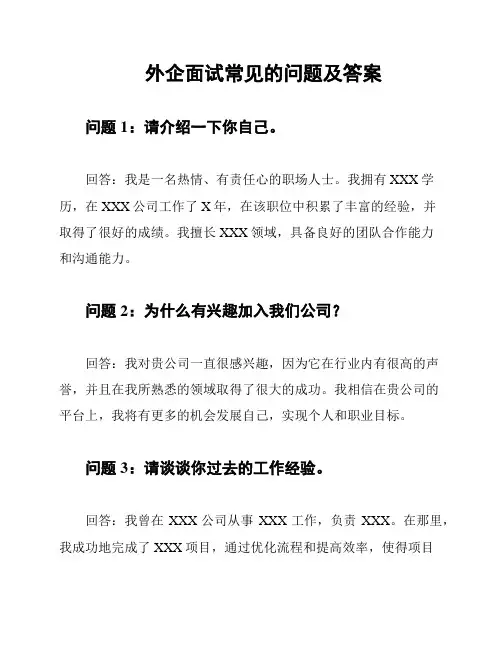
外企面试常见的问题及答案问题1:请介绍一下你自己。
回答:我是一名热情、有责任心的职场人士。
我拥有XXX学历,在XXX公司工作了X年,在该职位中积累了丰富的经验,并取得了很好的成绩。
我擅长XXX领域,具备良好的团队合作能力和沟通能力。
问题2:为什么有兴趣加入我们公司?回答:我对贵公司一直很感兴趣,因为它在行业内有很高的声誉,并且在我所熟悉的领域取得了很大的成功。
我相信在贵公司的平台上,我将有更多的机会发展自己,实现个人和职业目标。
问题3:请谈谈你过去的工作经验。
回答:我曾在XXX公司从事XXX工作,负责XXX。
在那里,我成功地完成了XXX项目,通过优化流程和提高效率,使得项目顺利交付,并获得了客户的高度评价。
此外,我还参与了XXX项目,通过团队合作和协调,取得了很好的成果。
问题4:你认为你的最大优点是什么?回答:我认为我的最大优点是我具备良好的组织能力和解决问题的能力。
我可以很好地管理时间和资源,使工作高效进行。
同时,我也非常善于找到问题的核心,并提出有效的解决方案。
问题5:你在工作中遇到的最大困难是什么?你是如何克服的?回答:在我过去的工作中,我曾遇到过一个复杂的项目,时间紧迫,需求频繁变动。
这给我带来了很大的压力和困难。
为了克服这个困难,我首先与团队成员进行了充分的沟通和协调,确保大家对项目目标的一致理解。
然后,我制定了详细的工作计划,并安排了合理的任务分配。
最后,我保持积极的态度,及时调整方案,妥善应对需求变动,并与团队紧密合作,最终成功地完成了项目。
结束语这些是外企面试中常见的问题及相应的答案。
希望能够对您有所帮助,在面试中取得好的成绩!。
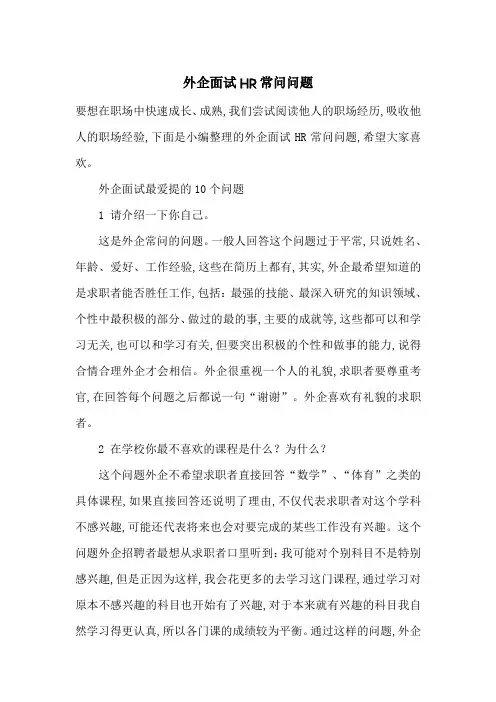
外企面试HR常问问题要想在职场中快速成长、成熟,我们尝试阅读他人的职场经历,吸收他人的职场经验,下面是小编整理的外企面试HR常问问题,希望大家喜欢。
外企面试最爱提的10个问题1 请介绍一下你自己。
这是外企常问的问题。
一般人回答这个问题过于平常,只说姓名、年龄、爱好、工作经验,这些在简历上都有,其实,外企最希望知道的是求职者能否胜任工作,包括:最强的技能、最深入研究的知识领域、个性中最积极的部分、做过的最的事,主要的成就等,这些都可以和学习无关,也可以和学习有关,但要突出积极的个性和做事的能力,说得合情合理外企才会相信。
外企很重视一个人的礼貌,求职者要尊重考官,在回答每个问题之后都说一句“谢谢”。
外企喜欢有礼貌的求职者。
2 在学校你最不喜欢的课程是什么?为什么?这个问题外企不希望求职者直接回答“数学”、“体育”之类的具体课程,如果直接回答还说明了理由,不仅代表求职者对这个学科不感兴趣,可能还代表将来也会对要完成的某些工作没有兴趣。
这个问题外企招聘者最想从求职者口里听到:我可能对个别科目不是特别感兴趣,但是正因为这样,我会花更多的去学习这门课程,通过学习对原本不感兴趣的科目也开始有了兴趣,对于本来就有兴趣的科目我自然学习得更认真,所以各门课的成绩较为平衡。
通过这样的问题,外企可以找到对任何事情都很感兴趣的求职者。
3 说说你最大的优缺点?这个问题外企问的概率很大,通常不希望听到直接回答的缺点是什么等,如果求职者说自己小心眼、爱忌妒人、非常懒、脾气大、工作效率低,外企肯定不会录用你。
外企喜欢求职者从自己的优点说起,中间加一些小缺点,最后再把问题转回到优点上,突出优点的部分。
外企喜欢聪明的求职者。
4 你认为你在学校属于好学生吗?外企的招聘者很精明,问这个问题可以试探出很多问题:如果求职者学习成绩好,就会说:“是的,我的成绩很好,所有的成绩都很优异。
当然,判断一个学生是不是好学生有很多标准,在学校期间我认为成绩是重要的,其他方面包括思想道德、实践经验、精神、能力也都是很重要的,我在这些方面也做得很好,应该说我是一个全面发展的学生。
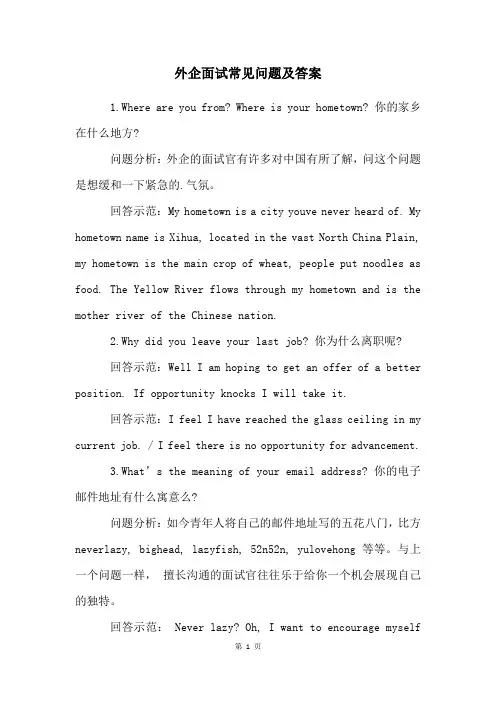
外企面试常见问题及答案1.Where are you from? Where is your hometown? 你的家乡在什么地方?问题分析:外企的面试官有许多对中国有所了解,问这个问题是想缓和一下紧急的.气氛。
回答示范:My hometown is a city youve never heard of. My hometown name is Xihua, located in the vast North China Plain, my hometown is the main crop of wheat, people put noodles as food. The Yellow River flows through my hometown and is the mother river of the Chinese nation.2.Why did you leave your last job? 你为什么离职呢?回答示范:Well I am hoping to get an offer of a better position. If opportunity knocks I will take it.回答示范:I feel I have reached the glass ceiling in my current job. / I feel there is no opportunity for advancement.3.What’s the meaning of your email address? 你的电子邮件地址有什么寓意么?问题分析:如今青年人将自己的邮件地址写的五花八门,比方neverlazy, bighead, lazyfish, 52n52n, yulovehong等等。
与上一个问题一样,擅长沟通的面试官往往乐于给你一个机会展现自己的独特。
回答示范: Never lazy? Oh, I want to encourage myselfnever to be lazy! You know I am a hardworking person. So, it’s my slogan!4.What subjects were your favorite? Why? 你最喜爱的课程是什么,为什么?问题分析:与中国面试官一样,对于应届毕业生,外国面试官常常问问有关学业方面的问题。
目录前言ﻩ错误!未定义书签。
一、PERSONALINFORMATION关于个人信息的问题 ........................... 错误!未定义书签。
1、ﻩWHAT’S THE MEANING OFYOUR E NGLISH NAME?您的英文名字有什么含义么?ﻩ错误!未定义书签。
2、WHAT’S THE MEANING OFYOUR EMAIL ADDRESS?您的电子邮件地址有什么寓意么?ﻩ错误!未定义书签。
3、WHERE ARE YOU FROM?W HERE IS YOUR HOMETOWN?您就是哪里人?家乡在什么地方? ... 错误!未定义书签。
二、EDUCATION 关于教育背景的问题ﻩ错误!未定义书签。
4、W HY DID YOU SELECT YOUR MAJOR AREA OF STUDY?您为什么选择了这个专业?... 错误!未定义书签。
5、WHAT SUBJECTS WEREYOUR FAVORITE?W HY?您最喜欢的课程就是什么,为什么? . 错误!未定义书签。
6、W HAT SUBJECTSWERE YOURLEASTFAVORITE?W HY?您最不喜欢的课程就是什么?为什么?ﻩ错误!未定义书签。
7、O THER THAN THECOURSESYOUSTUDIED, WHAT ISTHE MOST IMPORTANT THING YOU LEARNED FROM YOUR COLLEGE EXPERIENCE?除了学习方面,您在大学里面最大的收获就是什么?....................................................................................................................... 错误!未定义书签。
8.HOWDIDYOU FINANCE YOUR COLLEGEEDUCATION?您大学的费用就是怎么样支付的?(家里供还就是自己打工?) .......................................................................................... 错误!未定义书签。
外企面试官爱提的十个问题1.请介绍一下你自己。
这是外企常问的问题。
一般人回答这个问题过于平常,只说姓名、年龄、爱好、工作经验,这些在简历上都有,其实,外企最希望知道的是求职者能否胜任工作,包括:最强的技能、最深入研究的知识领域、个性中最积极的部分、做过的最成功的事,主要的成就等,这些都可以和学习无关,也可以和学习有关,但要突出积极的个性和做事的能力,说得合情合理外企才会相信。
外企很重视一个人的礼貌,求职者要尊重考官,在回答每个问题之后都说一句“谢谢”。
外企喜欢有礼貌的求职者。
2.在学校你最不喜欢的课程是什么?为什么?这个问题外企不希望求职者直接回答“数学”、“体育”之类的具体课程,如果直接回答还说明了理由,不仅代表求职者对这个学科不感兴趣,可能还代表将来也会对要完成的某些工作没有兴趣。
这个问题外企招聘者最想从求职者口里听到:我可能对个别科目不是特别感兴趣,但是正因为这样,我会花更多的时间去学习这门课程,通过学习对原本不感兴趣的科目也开始有了兴趣,对于本来就有兴趣的科目我自然学习得更认真,所以各门课的成绩较为平衡。
通过这样的问题,外企可以找到对任何事情都很感兴趣的求职者。
3.说说你最大的优缺点?这个问题外企问的概率很大,通常不希望听到直接回答的缺点是什么等,如果求职者说自己小心眼、爱忌妒人、非常懒、脾气大、工作效率低,外企肯定不会录用你。
外企喜欢求职者从自己的优点说起,中间加一些小缺点,最后再把问题转回到优点上,突出优点的部分。
外企喜欢聪明的求职者。
4.你认为你在学校属于好学生吗?外企的招聘者很精明,问这个问题可以试探出很多问题:如果求职者学习成绩好,就会说:“是的,我的成绩很好,所有的成绩都很优异。
当然,判断一个学生是不是好学生有很多标准,在学校期间我认为成绩是重要的,其他方面包括思想道德、实践经验、团队精神、沟通能力也都是很重要的,我在这些方面也做得很好,应该说我是一个全面发展的学生。
”如果求职者成绩不尽理想,便会说:“我认为是不是一个好学生的标准是多元化的,我的学习成绩还可以,在其他方面我的表现也很突出,比如我去很多地方实习过,我很喜欢在快节奏和压力下工作,我在学生会组织过××活动,锻炼了我的团队合作精神和组织能力。
外企面试十大问题(最新8篇)(经典版)编制人:__________________审核人:__________________审批人:__________________编制单位:__________________编制时间:____年____月____日序言下载提示:该文档是本店铺精心编制而成的,希望大家下载后,能够帮助大家解决实际问题。
文档下载后可定制修改,请根据实际需要进行调整和使用,谢谢!并且,本店铺为大家提供各种类型的经典范文,如工作资料、求职资料、报告大全、方案大全、合同协议、条据文书、教学资料、教案设计、作文大全、其他范文等等,想了解不同范文格式和写法,敬请关注!Download tips: This document is carefully compiled by this editor. I hope that after you download it, it can help you solve practical problems. The document can be customized and modified after downloading, please adjust and use it according to actual needs, thank you!In addition, this shop provides you with various types of classic model essays, such as work materials, job search materials, report encyclopedia, scheme encyclopedia, contract agreements, documents, teaching materials, teaching plan design, composition encyclopedia, other model essays, etc. if you want to understand different model essay formats and writing methods, please pay attention!外企面试十大问题(最新8篇)很多人喜欢去国企求职发展,但也随着外企发展以及优渥的待遇,很多求职者青睐外企,这次本店铺为您整理了外企面试十大问题(最新8篇),如果能帮助到您,本店铺的一切努力都是值得的。
外企面试问题参考外企面试是一种常见的面试形式,许多人都有可能接触到。
在外企面试中,面试官通常会问一系列的问题,以了解应聘者的能力、经验和个人素质。
下面是一些常见的外企面试问题的参考答案,供您参考。
1. 自我介绍这个问题是面试中最基本的问题,也是向面试官展示自己的第一次机会。
在回答该问题时,应聘者应简要介绍自己的姓名、教育背景、工作经验以及个人技能。
同时,还可以提到一些个人爱好和特长,以展示自己的多样性和全面素质。
2. 为什么选择应聘我们公司?这个问题是考察应聘者对公司的了解及其对公司的兴趣程度。
应聘者可以通过研究公司的产品、市场地位、企业文化等方面,找到与自己的经历、技能和兴趣相匹配的地方,并在回答时加以表达。
3. 为什么离开上一家公司?这个问题主要是考察应聘者的离职原因和应对困境的能力。
应聘者在回答时,应尽量避免批评上一家公司或上司,而是侧重强调自己的职业发展目标、个人成长需求等积极因素。
4. 描述一次在工作中遇到的挑战,并说明如何解决的。
这个问题是考察应聘者的问题解决能力和应对压力的能力。
应聘者在回答时,应先简单描述遇到的问题,然后重点强调自己采取的解决方法和取得的成果。
同时,还可以提及从这个挑战中所学到的经验和教训。
5. 你认为自己的最大优势是什么?这个问题是让应聘者自我评价的机会。
应聘者在回答时,应结合自己的经验和技能,向面试官展示自己在某个方面的优势。
例如,沟通能力、团队合作、问题解决能力等。
6. 你在前一份工作中的角色是如何的?这个问题是考察应聘者在前一份工作中的角色和职责。
应聘者应简要说明自己在团队中所担任的职务,并重点强调自己在工作中所取得的成绩和所发挥的作用。
7. 你对加班有没有抵触情绪?这个问题是考察应聘者的加班态度和应对压力的能力。
应聘者在回答时,应表明自己对加班的态度,同时要清楚表示愿意适应工作需要,根据工作情况灵活安排时间。
8. 描述一次你在工作中获得的最大成就。
这个问题是考察应聘者的工作能力和成果。
外企面试中50个常用问题1. tell me about yourself.能否谈谈你自己的情况2. what do you want to do with your life?你这一生将准备做些什么3. do you have any actual work experience?你有实际教育工作经验吗?4. how would you describe your ideal job?你对理想的工作是怎么看待的5. why did you choose this career?你为什么选择这个职业?6. when did you decide on this career?你是什么最合适时候同意选择这个职业的7. what goals do you have in your career?在职业生涯中你希望达到什么目标?8. how do you plan to achieve these goals?你计划如何达到这些目标?9. how do you evaluate success?你是如何评价突破性的?10. describe a situation in which you were successful.请简单谈谈令你感觉成功的具体情形?11. what do you think it takes to be successful in this career?你认为在这个交叉学科要成功需要做些需要什么准备?12. what accomplishments have given you the most satisfaction in your life?在你的职业生涯中那些成就使你最为满意?13. if you had to live your life over again, what would you change?假如人生可以当新开始,你会有些什么样的改变?14. would your rather work with information or with people?你喜欢与打交道还是喜欢同信息打交道?15. are you a team player?你是一位创业团队成员吗?16. what motivates you?你的动机是什么?17. why should i hire you?为什么我们实习用你?18. are you a goal-oriented person?你是目标导向型的人能吗?19. tell me about some of your recent goals and what you did to achieve them.能否谈一谈你的近期目标以及你准备怎样实现?20. what are your short-term goals?你的短期目标是什么?21. what is your long-range objective?你的长期目标是什么?22. what do you see yourself doing five years from now?从现在起5年内你借此机会做些什么?23. where do you want to be ten years from now?从现在起10周内你想做些什么?24. do you handle conflict well?你能妥善解决武装冲突吗?25. have you ever had a conflict with a boss or professor? how did you resolve it?你以前是否与老板或者导师结怨?你是如何处理的呢?26. what major problem have you had to deal with recently?近来你预处理的主要问题环境问题是什么?27. do you handle pressure well?你能应对压力型避免出现的工作环境吗?28. what is your greatest strength?你的突出优势是什么?29. what is your greatest weakness?你最大的不足是什么?30. if i were to ask one of your professors to describe you, what would he or she say?如果我向你的导师了解你紧急状况的情况,你认为他或者她会怎么评价你?31. why did you choose to attend your college?你为什么去之上大学?32. what changes would you make at your college?在大学里你将会有什么变化33. how has your education prepared you for your career?你认为自己的学业对你的职业生涯做了哪些准备34. what were your favorite classes? why?你喜欢那些课程?为什么?35. do you enjoy doing independent research?你喜欢独立搞学术研究吗?36. who were your favorite professors? why?你喜欢那些教授?为什么?37. why is your gpa not higher?你的学业成绩为什么相对较低?38. do you have any plans for further education?你对自己的求学有什么安排安排吗?39. how much training do you think you'll need to becomea productive employee?在成为一名优秀的社员员工之前,你认为需要多长时间的培训?40. what qualities do you feel a successful manager should have?你认为一个成功的经理应具备什么样的品质?41. why do you want to work in the _____ industry?你为什么会对本行业有兴趣?42. what do you know about our company?你对我们公司了解些什么?43. why are you interested in our company?你为什么会对我们公司颇感兴趣?44. do you have any location preferences?你对工作地点有什么特殊要求吗?45. how familiar are you with the ity that we're located in?你对我们所在的社区了解程度有多少?46. will you relocate? in the future?将来你会迁入别处吗?47. are you willing to travel? how much?你愿意去旅行吗?去多远48. is money important to you?金钱对于你来说很重要吗?49. how much money do you need to make to be happy?多少周薪你会感觉满意50. what kind of salary are you looking for?您的期望遣散费是多少?对这些结构性问题多做练习,不能只在头脑中想一想就算完事。
外企面试官们爱提的十个问题(转)-----大家看看你们面试时是这样的吗?
1.请介绍一下你自己。
这是外企常问的问题。
一般人回答这个问题过于平常,只说姓名、年龄、爱好、工作经验,这些在简历上都有,其实,外企最希望知道的是求职者能否胜任工作,包括:最强的技能、最深入研究的知识领域、个性中最积极的部分、做过的最成功的事,主要的成就等,这些都可以和学习无关,也可以和学习有关,但要突出积极的个性和做事的能力,说得合情合理外企才会相信。
外企很重视一个人的礼貌,求职者要尊重考官,在回答每个问题之后都说一句“谢谢”。
外企喜欢有礼貌的求职者。
2.在学校你最不喜欢的课程是什么?为什么?
这个问题外企不希望求职者直接回答“数学”、“体育”之类的具体课程,如果直接回答还说明了理由,不仅代表求职者对这个学科不感兴趣,可能还代表将来也会对要完成的某些工作没有兴趣。
这个问题外企招聘者最想从求职者口里听到:我可能对个别科目不是特别感兴趣,但是正因为这样,我会花更多的时间去学习这门课程,通过学习对原本不感兴趣的科目也开始有了兴趣,对于本来就有兴趣的科目我自然学习得更认真,所以各门课的成绩较为平衡。
通过这样的问题,外企可以找到对任何事情都很感兴趣的求职者。
3.说说你最大的优缺点?
这个问题外企问的概率很大,通常不希望听到直接回答的缺点是什么等,如果求职者说自己小心眼、爱忌妒人、非常懒、脾气大、工作效率低,外企肯定不会录用你。
外企喜欢求职者从自己的优点说起,中间加一些小缺点,最后再把问题转回到优点上,突出优点的部分。
外企喜欢聪明的求职者。
4.你认为你在学校属于好学生吗?
外企的招聘者很精明,问这个问题可以试探出很多问题:如果求职者学习成绩好,就会说:“是的,我的成绩很好,所有的成绩都很优异。
当然,判断一个学生是不是好学生有很多标准,在学校期间我认为成绩是重要的,其他方面包括思想道德、实践经验、团队精神、沟通能力也都是很重要的,我在这些方面也做得很好,应该说我是一个全面发展的学生。
”如果求职者成绩不尽理想,便会说:“我认为是不是一个好学生的标准是多元化的,我的学习成绩还可以,在其他方面我的表现也很突出,比如我去很多地方实习过,我很喜欢在快节奏和压力下工作,我在学生会组织过××活动,锻炼了我的团队合作精神和组织能力。
” 有经验的招聘者一听就会明白,外企喜欢诚实的求职者。
5.说说你的家庭。
外企面试时询问家庭问题不是非要知道求职者家庭的情况,探究隐私,外企不喜欢探究个人隐私,而是要了解家庭背景对求职者的塑造和影响。
外企希望听到的重点也在于家庭对求职者的积极影响。
外企最喜欢听到的是:我很爱我的家庭!我的家庭一向很和睦,虽然我的父亲和母亲都是普通人,但是从小,我就看到我父亲起早贪黑,每天工作特别勤劳,他的行动无形中培养了我认真负责的态度和勤劳的精神。
我母亲为人善良,对人热情,特别乐于助人,所以在单位人缘很好,她的一言一行也一直在教导我做人的道理。
外企相信,和睦的家庭关系对一个人的成长有潜移默化的影响。
6.说说你对行业、技术发展趋势的看法?
外企对这个问题很感兴趣,只有有备而来的求职者能够过关。
求职者可以直接在网上查找对你所申请的行业部门的信息,只有深入了解才能产生独特的见解。
外企认为最聪明的求职者是对所面试的公司预先了解很多,包括公司各个部门,发展情况,在面试回答问题的时候可以提到所了解的情况,外企欢迎进入企业的人是“知己”,而不是“盲人”。
7.就你申请的这个职位,你认为你还欠缺什么?
外企喜欢问求职者弱点,但精明的求职者一般不直接回答。
他们希望看到这样的求职者:继续重复自己的优势,然后说:“对于这个职位和我的能力来说,我相信自己是可以胜任的,只是缺乏经验,这个问题我想我可以进入公司以后以最短的时间来解决,我的学习能力很强,我相信可以很快融入公司的企业文化,进入工作状态。
”外企喜欢能够巧妙地躲过难题的求职者。
8.你期望的工资是多少?
外企的工资水平是很灵活的,何种能力拿何种工资。
外企喜欢直率的人,但这个问题却不能正面回答,外企希望听到:“以我的能力和我的优势,我完全可以胜任这个职位,我相信我可以做得很好。
但是贵公司对这个职位的描述不是很具体,我想还可以延后再讨论”。
外企欢迎求职者给其定薪的自由度,而不是咬准一个价码。
9.你能给公司带来什么?
外企很想知道未来的员工能为企业做什么,求职者应再次重复自己的优势,然后说:“就我的能力,我可以做一个优秀的员工在组织中发挥能力,给组织带来高效率和更多的收益”。
外企喜欢求职者就申请的职位表明自己的能力,比如申请营销之类的职位,可以说:“我可以开发大量的新客户,同时,对老客户做更全面周到的服务,开发老客户的新需求和消费。
”等等。
10.你还有什么问题吗?
外企的这个问题看上去可有可无,其实很关键,外企不喜欢说“没有问题”的人,因为其很注重员工的个性和创新能力。
外企不喜欢求职者问个人福利之类的问题,如果有人这样问:贵公司对新入公司的员工有没有什么培训项目,我可以参加吗?或者说贵公司的晋升机制是什么样的?外企将很欢迎,因为体现出你对学习的热情和对公司的忠诚度以及你的上进心。